What is analytical meditation
Analytical or insight meditation is a form of meditation in which the meditator intentionally investigates the nature of phenomena, using intelligence, critical thinking, and logic.
The goal of analytical meditation is to gain a deeper understanding of how we ourselves, our thoughts, emotions, relationships, and all things and events exist within the world in which we inhabit. Ultimately leading the meditator to abandon afflictive emotions and cultivate constructive emotions and true happiness.
Analytic meditation is recognised as one of the key Buddhist meditation techniques and is recommended by many spiritual leaders. However, this type of meditation practice is not exclusively for use by those following a spiritual path. Analytical meditation is suitable to be included in the mental health toolbox of anyone who wishes to engage in personal analysis and develop an analytical mind.
Benefits of analytical meditation
Analytical meditation is a powerful technique which offers numerous benefits. This powerful practice helps one attain a mind of genuine certainty in regard to its object of analysis, and overcome misconceptions, wrong views and difficult emotions.
Through continued analytic meditation practice cultivating wholesome emotions, and investigating their nature, and how they arise, the pattern of thinking of the subconscious mind is able to positively transform, manifesting as the very real experience of genuine self-value, love and compassion for others, with a heightened level of sense of clarity.
As we experience a decrease in negative emotions and an increase in constructive emotions, the positive effects of attaining a peaceful mind directly benefits our physical health.
Objects of analytical meditation
Any object or event is suitable as an object of meditation in terms of undergoing systematic investigation. Certainly, it is beneficial to investigate the conventional and ultimate nature of phenomena that are external to our own continuum. However, it is by taking ourselves, our feelings, emotions, mind and body as the object of meditation, and cultivating a deep understanding of their true nature, that we are able to achieve true happiness.
We want to achieve happiness and don’t want to suffer, however, it is the afflictive emotions which cause our suffering and prevent our experience of happiness, therefore we need to abandon the afflictive emotions, and in order to do that we need to have certainty that they are the objects to be abandoned.
By identifying the destructive emotions, and analysing them through critical thinking, determining their entity, characteristics, causes and negative effects, measured against our own direct experience, we begin the process of gaining certainty that they are indeed objects to be abandoned. Naturally from reaching this conclusion, we search for the antidote, that will help subdue and finally eliminate those destructive minds.
Hatred is contradictory to love and love serves as an antidote to hatred, the two minds cannot be manifest in a person’s mental continuum simultaneously. However, to gain certainty on this point and to be able to rouse a motivation to cultivate love at the time when we identify that we have a hostile mind directed toward someone else, we need to generate a mind of strong belief that love is an effective antidote in that circumstance. We cultivate a conviction in the qualities of love by engaging in analytical meditation, taking love as our object of analysis. Through critical analysis, we are able to develop mental clarity regards love’s entity, characteristics, causes and positive effects. This conclusion we measure against our own direct experience, helping to deepen our realisation.
We can also analyse events and situations in which we have found or expect to find ourselves in. For example, if we feel hostile towards someone, we can investigate to ascertain if the root cause of this manifest hostile mind is to be found in that person’s actions or if the root cause is a negative state of mind found within my own continuum. We may conclude that another person’s actions acted as a trigger, but can we ascertain that the other person’s actions where the root cause of my negative mind?
How to practice analytical meditation
When engaging in critical thinking we require a subject to investigate and then build a thesis around that subject, proving or disproving its validity by way of asserting a correct reason or sign.
For instance, we can take anger as our subject and assert that it is an object to be abandoned, thereby creating the thesis;
“Anger is an object to be abondoned”
We may agree with this, but in order to gain a deeper understanding, an inferential realisation we need to employ critical thinking and posit a valid reason. For example;
“Anger is an object to be abandoned because it takes the peaceful aspect from the mind”
By asserting the reason, “it takes the peaceful aspect from the mind” we have now generated a full syllogism proving our thesis is valid, and correct. or have we ?
At this point, we need to check with analysis;
Is it true that anger takes the peaceful aspect from the mind? yes!
Is it true that whatever takes the peaceful aspect from the mind is an object to be abandoned? yes!
Through employing this rigorous form of logic and analysis we have been able to prove that our thesis is indeed valid. Moving forwrd we now familiarise ourselves with this conclusion, supported by real-life examples, which in turn supports the cultivation and manifestion of a sustainable flow of wholesome emotions, giving rise to a more peaceful and harmonious life.


